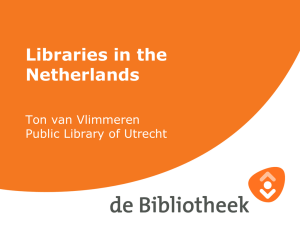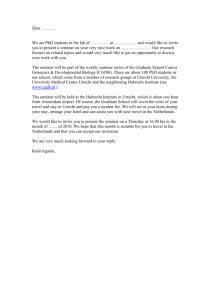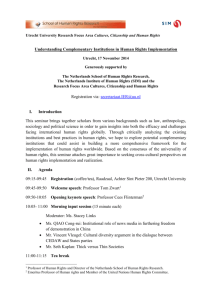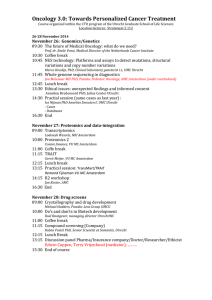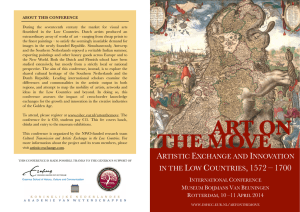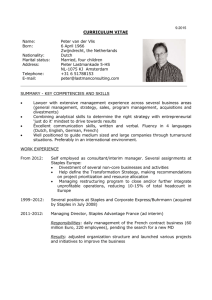Netherlands_2015 - Epiet Alumni Network
advertisement
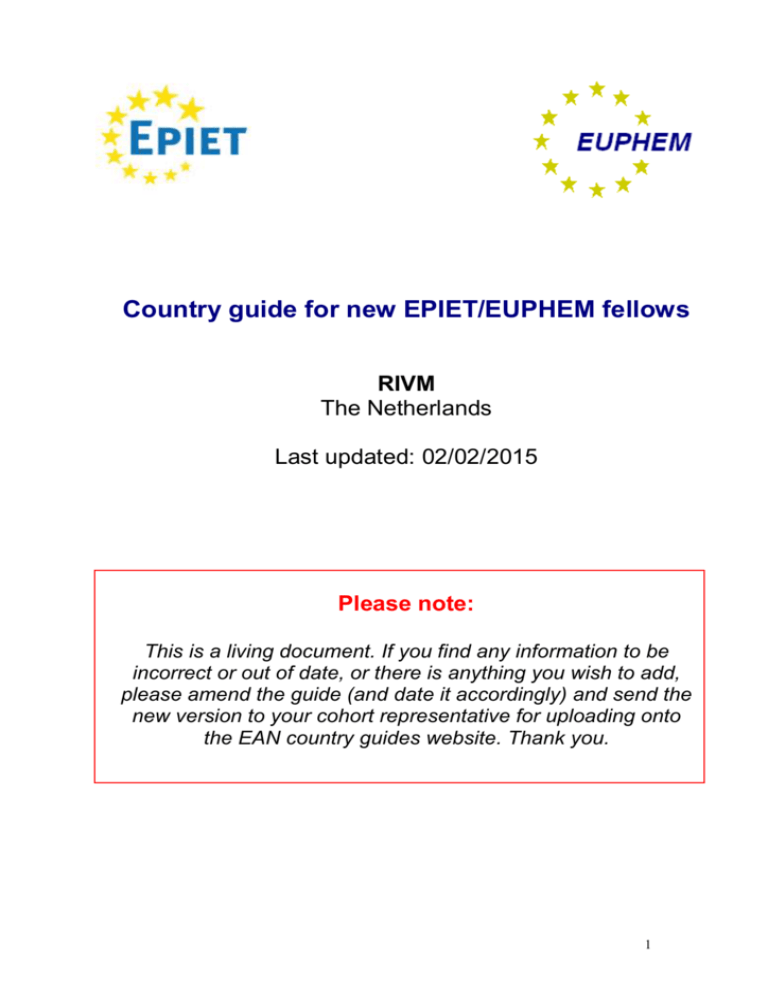
Country guide for new EPIET/EUPHEM fellows RIVM The Netherlands Last updated: 02/02/2015 Please note: This is a living document. If you find any information to be incorrect or out of date, or there is anything you wish to add, please amend the guide (and date it accordingly) and send the new version to your cohort representative for uploading onto the EAN country guides website. Thank you. 1 Contents FLAT HUNTING .......................................................................................................................3 ON ARRIVAL - STARTING OUT IN THE NETHERLANDS ...............................................5 REMOVAL ................................................................................................................................6 BANKING..................................................................................................................................6 PENSION ...................................................................................................................................6 TAXES .......................................................................................................................................7 HEALTH INSURANCE AND HEALTH CARE ......................................................................7 LANGUAGE SCHOOLS ...........................................................................................................8 TRANSPORT TO AND FROM THE NETHERLANDS ........................................................12 SHOPPING IN THE NETHERLANDS...................................................................................13 BIKING IN THE NETHERLANDS ........................................................................................14 LEAVING THE NETHERLANDS .........................................................................................14 FREE LEGAL ADVICE ..........................................................................................................14 USEFUL WEBSITES AND RESOURCES .............................................................................14 USEFUL TIPS FOR STARTING THE FELLOWSHIP ..........................................................15 CONTACTS .............................................................................................................................16 GENERAL ADVICE FOR FELLOWSHIPS Useful list of abbreviations Google Translate cannot handle: ..................................................16 2 FLAT HUNTING Background The first thing you should do is decide whether you prefer to live in Amsterdam, Utrecht or elsewhere (eg. Bilthoven, De Bilt, Zeist). Amsterdam has all the benefits of a capital city. Utrecht is smaller and quieter, but still quite bustling as it is a student town. Utrecht is only 30 mins by train from Amsterdam (trains run through the night). It takes about 20-25 minutes to bike from the centre of Utrecht to RIVM. It takes a bit over an hour to get from RIVM to Amsterdam by public transport. Once you have decided where you would like to live, the best (and most cost effective) way of getting an apartment is through someone you know, or through a contact, such as Susan, or EPIET/EUPHEM fellows from cohorts above who are leaving! However, if there is nothing around you may have to go through a website/agency. BEWARE OF ANY AGENCY THAT ASKS YOU TO PAY FEES UPFRONT. Most agencies will help you look for free; the deal is that if you find a flat through them, you pay them one month’s rent as a fee (thereafter, all your rent goes 100% to the landlord and none to the estate agency). Bear in mind that you will also probably be paying at least one month’s rent as a deposit for the landlord, so it can be pretty expensive at the outset. BEWARE OF SCAMS – these are common on some websites. Never transfer money before you have the key. If you think something might be a scam, google the address or the email address – often you will see people have already reported it on various blogs. Rental duration is variable, but for most nice apartments, they expect you to take it for a year. To leave, you usually have to give one month’s notice (and the landlord has to give you two months’ notice if they decide they don’t want to rent the apartment out anymore). Rentals are quite expensive in the Netherlands (Amsterdam and Utrecht are the most expensive cities), depending of course which level you are used to in your home country. Also, many apartments are quite small. For a studio/one bedroom flat in a central location, you’re probably looking at 750 – 900 EUR per month with or without utilities included (but better deals can be found if you look around, or you can room-share for a cheaper option). Flat-shares This is a viable and cheaper option if you don’t mind sharing. Be prepared to be interviewed by the tenants who already live there! This is called a “hospiteren” in Dutch. 3 Websites http://www.pararius.com/english/clientHome.php?lvl1=1&lvl2=1 Pararius is specialised for expats moving to the Netherlands, which has the advantage that it is in English. In addition, many of the flats come furnished as well as unfurnished. Many estate agents list their available properties here, and it is a great starting point to see what is available. http://kopen.marktplaats.nl/huizen-en-kamers/c1032.html This website has many of the available rooms/apartments listed. Most of the estate agents put their rooms on this site as well as their own websites. So, it is a good starting point even just for getting an idea of how much your money can get you. Unfortunately it is in Dutch, but Google translate can help there. http://www.bnsrentalservice.nl/en/ B&S Rentals is an estate agency based in Utrecht also specialising in rentals for expats – this has the advantage that they will prepare contracts etc in English so you know what you’re signing. https://sites.google.com/site/ingutrecht/ The International Neighbour Group in Utrecht is intended for expats linked to the university, but anyone can join their google group. A lot of rooms and flats are advertised via this group. Also, you can get good deals on second hand furniture or bikes on this site! Some other websites http://amsterdam.nl.craigslist.org/roo/ http://www.expat-blog.com/en/classifieds/europe/netherlands/flat-share-house-share.html http://kamernet.nl/ - also a good site to see what is available in the area you are interested in living, but use with caution. Quite a lot of scams on this site! Good/bad locations In Utrecht: City centre, Wilhelmina Park, Wittevrouwen, Lombok are great areas. Avoid Kanaleneiland (Canal Island), Ondiep and Overvecht. In Amsterdam: Avoid anywhere located too far from the train station, as your commute could get too long. There are direct connections to Utrecht from Amsterdam Amstel (closest to Utrecht), Amsterdam Zuid, Amsterdam Centraal and Amsterdam Sloterdijk (not a very nice area). 4 ON ARRIVAL - STARTING OUT IN THE NETHERLANDS 1) Get a BSN (burgerservicenummer) This is the Dutch equivalent of the social security number. It used to be called a SoFi nummer so a lot of people still say that word as it only changed a few years ago. In order to get paid by RIVM and get your work ID, you need your BSN. You also need a BSN to open a bank account. However, in order to get a BSN, you do need to have a proof of address (i.e. tenancy agreement). So, accommodation comes first and then you can get a BSN. You need to present the following documents at the Tax Office: Valid identification, e.g. your passport (driving licence is not valid for this purpose) Proof of address. If you are not registered at the council, you will be asked for proof of address Residence and/or work permit. You will not need a residence and/or work permit if you are originating from Belgium, Cyprus (Greek part), Denmark, Germany, Estonia, Finland, France, Greece, Great Britain, Hungary, Ireland, Italy, Latvia, Liechtenstein, Lithuania, Luxemburg, Malta, The Netherlands, Norway, Austria, Poland, Portugal, Spain, Slovenia, the Czech Republic, Iceland, Sweden or Switzerland You can get your BSN from the Municipality office Gemeente Utrecht http://www.utrecht.nl/startpagina/. The website is also in English. If living in Utrecht, this is located at Stadsplateau 1, Utrecht. It is worthwhile calling them beforehand to double check where you should go and what you need just in case arrangements have changed. Tel - 030 - 286 00 00. Once you have applied for the BSN, it takes about 5-10 days to arrive (they will send it to your place of residence. But, you can ask to have some form of documentation that day (because you need to have your BSN number to open a bank account so for your house contents insurance - see the “Banking” section- it could be useful to when you leave your flat to go on the introductory course for 3 weeks, just in case of fire or something like that…). 2) Get a bank account There are many services that are more difficult to access if you don’t have a Dutch bank account. See the “Banking” section for more information on how/where to open an account. 3) Dutch mobile phone There are various phone shops on Lange Elisabethstraat (near Utrecht CS) including the Phone House, which deals with all networks so you can compare/contrast. You can also opt for pre-paid: T-mobile international has good rates for international calling/messaging, but of course explore others as well. If you want to get a phone contract, you will need to have a Dutch bank account. 5 REMOVAL Get a few quotations for your removal. For cohort 2014, removal expenses are paid by RIVM against the receipts. The quotations needed not to be given to RIVM but just in case it is good to keep them if they ask for them afterwards. The reimbursement takes some time as it is new that RIVM pays directly and not the ECDC. BANKING To open an account with a Dutch bank, you will need to bring various documents with you in order to satisfy the usual bureaucratic requirements: Identity Document - Passport or Dutch Driving Licence. ID cards from some EU countries may be acceptable. Your BSN / SoFi number - if you don’t have it yet, but have applied for it, you can still open an account (they will enter a number like 9999999 where the BSN should be on your application) but you will have to go back into the bank with your BSN document within two weeks or your account will be frozen. Proof of Address - For example, tenancy agreement; utility bill less than 3 months old Proof of Income – Your employment contract should do, but it may be worthwhile taking along your offer letter, or letter from RIVM confirming employment status if possible. The bank many EPIETs have used which is ABN AMRO. It has a lot of its information in English, including internet banking, and has branches at Neude, Hoog Catharijne in Utrecht and De Bilt (close to RIVM). www.abnamro.nl/ You need to make an appointment with the bank in order to set up an account/overdraft etc (i.e. you cannot just go into the bank and do it there and then).To make an appointment, call 0900 - 00 24 (€ 0.10 per minute) for more information. Choose option ‘4’ for an English-language menu. From outside the Netherlands, call +31 10 - 241 17 20. Ask to be put through to the relevant branch. ABN AMRO in Neude is open at the following times: Monday 11.00 - 17.00 Tuesday 09.00 - 17.00 Wednesday 09.00 - 17.00 Thursday 09.00 - 20.00 Friday 09.00 - 17.00 Saturday 10.00 - 14.00 PENSION As you are officially employed by RIVM (based on rules for cohort 2013 and 2014), pension contributions will be normally deducted from your gross salary. 6 TAXES As you are officially employed by RIVM, you will pay taxes normally from your gross salary. Your gross salary is estimated from the pre-determined net salary (based on ECDC decision for each cohort, subject to change). Also, since you are employed by RIVM, you may (have to check whether this applies for each cohort) be entitled to annual holiday allowance of 8% and an end-of-year bonus of 8.3% of your gross salary. HR at RIVM The contact person for HR in RIVM is Jacqueline Servais (Jacqueline.servais@rivm.nl). With her you deal with the removal costs, language class reimbursements. Ask her also to explain to you P-direkt portal which is the HR website where you see your salary slips, annual leave days etc. HEALTH INSURANCE AND HEALTH CARE Health insurance You have to get a health insurance in the Netherlands. Part of the contribution is already deducted from your gross salary but the other part you have to pay yourself from your net salary. There are several providers but apparently RIVM has a deal with OHRA (http://www.ohra.nl/zorgverzekering/documenten/english.jsp) and it seems to be good, costs around 98 euros/month. The HRM-advisers will help you with the application etc. Useful numbers The emergency number in the Netherlands is 112. If you have an accident/illness out of normal GP surgery hours, but it is not threatening, you should call the number of your local huisartsenpost. These clinics provide treatment and care between the hours of 5pm and 8am for conditions that are not life-threatening (i.e., you won’t need to go to the local hospital’s emergency department). The number for Utrecht is 0900 - 450 1 450. Susan Hahné (EPIET supervisor) can also be called when necessary: her mobile number is +31 (0)6 4684 3623. Accessing healthcare Click on the link below for information on accessing healthcare. http://www.access-nl.org/ OTHER INSURANCES YOU SHOULD GET ARE: Liability insurance Everyone in the Netherlands has this. If you have an accident and damage somebody else or their property, they will generally claim against your insurance – which means it’s a 7 good idea to have some! You can get this insurance through ABN AMRO, and possibly through other banks so check there first You may also want to get: House contents insurance Also available through ABN AMRO. LANGUAGE SCHOOLS It is a good idea to start off with an intensive course, as there is so much travel in the first few months of the fellowship that you will miss several lessons if arranged weekly. SCHOOLS IN AMSTERDAM Joost Weet Het! This school regularly offers 4 hour per day, 4 day a week classes for a period of 2, 3 or 4 weeks. The classes are cheap but pretty basic (e.g. you have no access to further resources such as language laboratories), but for an absolute beginner they’re a very good start, especially as they offer intensive courses in November. http://www.joostweethet.nl/index.php?id=24&action=switch_language INTT - Institute for Dutch as a second Language Part of the University of Amsterdam, the INTT offers both intensive and evening courses at all levels, and is walking distance from Amsterdam CS. Has a 3 week winter course for absolute beginners right at the start of the New Year (useful if you’ve not managed to have any lessons in the first few months of the fellowship). http://www.intt.uva.nl/home Vrije Universiteit The second university in Amsterdam, which also has a department for Dutch as a second language offering intensive courses and evening courses at all levels. Very near Amsterdam Zuid station, so also good for people living in Utrecht (20 minutes by train). NB –class sizes for this course are very large (15 minimum), so they’re good for making friends but not so good if you want to learn quickly. http://www.let.vu.nl/en/department-dutch-as-a-second-language/courses-indutch/index.asp SCHOOLS IN UTRECHT Lest Best A good option that has been used by EPIET fellows in the past: http://www.lestbest.nl/index.php?webtekstid=11 This school offers classes on a rolling scale, so there are no fixed start dates for lessons. Both private and group classes are available. Depending on your level, it may be possible 8 for you to join a group class which will make your 1500 allowance stretch further (and is also a good way of making friends). The best thing to do is to phone Els, the school director, for more information. Babel Talen http://www.babel.nl/ This is also a good option, and used in the past. The school offers different kind of courses (intensive, once a week etc) and both group and private classes. It is located close to Wilhelminapark. The class sizes are limited, so if you are planning on taking a course – it’s good to book in advance. Useful websites www.lauraspeaksdutch.info - this is a really cute little podcast that a Dutchman made for his American girlfriend to learn Dutch while she was in the USA....it quickly became one of the most popular web resources for learning Dutch (you will fall a little bit in love with the guy who produced it) This site is EXCELLENT - http://web.me.com/schuffelen/Site/LearningDutch.html focusses a lot on pronunciation and guides you through lesson by lesson Also, www.dutchgrammar.com has lots of useful stuff, including a very comprehensive Dutch grammar book (which explains the rules in English) which costs only €3.75 to download. The Verbix verb conjugator is great when you can’t remember how to put something into the past tense: http://www.verbix.com/languages/dutch.shtml . http://www.mijnwoordenboek.nl/ - online dictionary into English/German/French/Spanish; good to have open in Internet Explorer whilst at work Watch http://www.uitzendinggemist.nl/ for Dutch TV …and Sesame Street plus many other delights at http://www.2bdutch.nl/ Other tips You can get subtitles on most Dutch programmes on TV by going to teletext page 888. The subtitles are for deaf Dutch people, but may help you understand the programmes better! There are various iPhone apps available for learning Dutch. Practising Dutch can be hard as everyone speaks such good English. The nationwide voluntary organization Het Gilde has volunteers who will help teach you Dutch through conversation – http://www.gilde-samenspraak.nl/ http://www.gilde-samenspraak.nl/gilden/index.asp?nodeid=192&p=10&bs=on#result 9 TRANSPORT IN THE NETHERLANDS www.9292ov.nl contains information and schedules for all transportation (including changing trains, buses and trams) in the whole country. You can put it in English! Buses You can pay for a ticket on the bus, but it’s more convenient and cheaper to get an OV Chipkaart (see below). To get to RIVM: Bus number 77 goes to RIVM from Utrecht CS, also stopping at Neude, Janskerkhof and Oorsprongpark, among others. Get off at Dr Letteplein (there is a screen that tells you what stop is coming up) and continue straight and walk up this road for about 5-10 minutes. You’ll pass a modern church on your right, then after a few more minutes you’ll see a road going off to the right with a sign for RIVM; it’s about a 5 minute walk from there. Two buses in the morning, around 8:00 (check the schedule for exact times), stop just close to the RIVM. In the afternoon, three also stop close to the RIVM (check the schedule for exact times) Bus number 257 goes direct to RIVM from Utrecht CS with no stops. It’s a once-a-day service, leaving Utrecht CS at 0809 and RIVM at 1705. 10 Trains www.ns.nl is your friend for train schedules. Tickets can be bought in machines at the station, but if you have a foreign card the machines may not recognise it, in which case you’d have to the NS office in the station (NB buying your ticket at an office costs 50 cents more to cover the “service charge”). Tickets don't have a time stamp on them, just the date, so they're valid for any single journey on the day. If the date is not written, you need to stamp the ticket in the yellow validator machines before going down to the platform If you are making a day return trip, buying dagretour (day return) tickets are cheaper than buying two single tickets. Alternatively, you can buy an OV Chipkaart for €7,50 at the NS office. It is useful to have the OV Chipkaart at the beginning, as you can use it both busses and trains – more information below. The OV Chipkaart https://www.ov-chipkaart.nl/reizen/gebruikovchipkaart/inenuitchecken/?taal=en This is a cheaper and quicker alternative to buying separate tickets for public transport in the Netherlands. This is a swipe card, which you top up with money. You then swipe the card at the start and end of your journey and it deducts the cost. Be sure to swipe out at the end otherwise you will be charged a maximum fare of € 4 if you travelled by bus and 20e if you forget to swipe out after travelling by train. There are different types of card you can buy – e.g. if you buy a personalised card, you can set it to automatically recharge from your bank account if the credit drops to a certain level. So, you will never be stuck without bus or train fare. All OV Chipkaarts can be topped up online, at railway staitons, and at certain shops (e.g. Albert Heijn). You need to have a €20 minimum on the card for train journeys and a €4 for bus journeys. Since you have a contract with RIVM you are eligible for a free bus journey from home to RIVM. Ask for this at HRM department. Off peak discount pass This is a really good deal! This pass costs 55 euros for a year, and entitles you to 40% discount on all train travel after 9:00am Monday – Friday, and all day at weekends and public holidays. What’s more, it applies to both first and second-class tickets. You can also get the 40% discount for up to three people traveling with you! So it’s excellent if you have visitors coming to stay. There’s no info about this scheme on the website in English at the moment, so ask at the station for an application form. You will need a Dutch bank account and a passport photo (there are photo machines at Utrecht CS). Once you have applied you will receive a personal OV Chipkaart with the discount “embedded” in it a few weeks later. If you take a contract to have a 40% discount, make sure that your Chipkaart is activated before you use it. You need also to activate it again the 1st of January – you’ll get a letter to remind you. 11 TRANSPORT TO AND FROM THE NETHERLANDS Air Getting to the airport: Schiphol, the Amsterdam airport, is connected to Utrecht with a direct line. So, once at Schiphol, just get yourself a ticket to Utrecht Centraal and make sure to get the intercity train. The intercity train (or “sneltrein”) takes about 33 minutes to reach Utrecht whereas a regular stoptrein takes about an hour (the ticket price is calculated by distance, so it’s no more expensive to get the fast train). The train's final destination should be Utrecht Centraal or a city further south. You can check this with any police officer at the airport, they're friendly and speak English. You can check for cheap flight tickets at http://www.vliegtickets.nl/ Dutch) or www.tix.nl (in Train http://www.nshispeed.nl/en Hispeed offers cheap train travel across Europe and is often cheaper than going through the individual train companies – e.g. it costs far less if you travel with Dutch trains and then Eurostar from Brussels than it costs to book a Eurostar ticket from Amsterdam to London. If you book via the Eurostar website, clicking on “any Dutch station” instead of Amsterdam or Utrecht, will give you a ticket for the Dutch trains. Ferry You can get ferries to all sorts of places in Europe from the Hook of Holland or Rotterdam. It takes a while, but is a good alternative for snowy Christmases/volcanic eruptions! http://hookofholland.com/ . The ‘rail and sail’ option will give you a train ticket to/from London and any Dutch station. Eurolines For cheap (but uncomfortable!) coach travel all across Europe. www.eurolines.nl 12 SHOPPING IN THE NETHERLANDS Most shops stay open late on Thursdays. They are generally closed on Sundays, although in Utrect some shops are open on Sundays 12-18 pm. In December many shops are open on Sundays and most evenings. Useful shops for day-to-day living include: Albert Heijn This is the main supermarket in the Netherlands. The bigger ones are usually open till 10pm, and on Sundays from 4pm-9pm or 12pm-7pm. You can receive good discounts with an Albert Heijn Bonus Card (available from the service desk). Blokker Sells almost everything you could possibly need for the house – light bulbs, toasters, candles, cushions, extension leads…you name it, it’s probably got it. And it’s cheap. Hema Sells almost everything you could possibly need for life itself – also very cheap. There’s a big one on the Oudegracht diagonally opposite the Winkel van Sinkel. Ikea Needs no introduction. There’s one in Utrecht and one in Amsterdam. Utrecht: http://www.ikea.com/nl/nl/store/utrecht Amsterdam: http://www.ikea.com/nl/nl/store/amsterdam Both are accessible by public transport (see websites for details) Etos Stocks toiletries, make-up, bathroom stuff, etc Kruidvat Like Etos, but cheaper!! www.bol.com Is the Dutch version of Amazon. www.marktplaats.nl Is the Dutch version of Ebay 13 BIKING IN THE NETHERLANDS There is a bike loan scheme at RIVM; ask the secretariat for more details. For more info on cycling in the Netherlands, please consult the Access booklet http://www.access-nl.org/our_services/pdf/booklets/cycling_in_the_netherlands.pdf LEAVING THE NETHERLANDS For administrative advice on how to de-register etc when you’ve come to the end of your fellowship, please consult the following Access guide (double click to open). http://www.access-nl.org/our_services/pdf/booklets/leaving_the_netherlands.pdf FREE LEGAL ADVICE If for any reason during your stay you find yourself needing legal advice, the Rechtswinkel in Utrecht can help: http://www.rechtswinkelutrecht.nl/index.php USEFUL WEBSITES AND RESOURCES Expats http://www.access-nl.org/ - Access is a non-for profit organisation set up to support expats. They provide free information and advice via our helpdesk and personal consultation services. We also offer a unique and free referral service to our professional counsellor network. Lastly, they have a range of useful information sheets on a range of topics e.g. healthcare in the Netherlands, which can be downloaded for free from http://www.access-nl.org/shop/more_info_booklets.htm ). www.expatica.nl http://www.xpat.nl/home The International Neighbour Group is aimed for people new to Utrecht to meet each other and start making friends in a new city. It meets every Wednesday at Café Jan Primus near Wilhelmina Park: http://ing-utrecht.squarespace.com/ Stuff Dutch People like is a great blog for helping you understand all the weird and wonderful habits of the Dutch people!: http://stuffdutchpeoplelike.com/ Leisure www.iamamsterdam – covers all the current events/shows/exhibitions etc in Amsterdam http://www.utrecht.nl/ website for Utrecht council, has all sorts of info on all sorts of things e.g. courses, location of gyms. leisure centres, history of the city etc 14 http://www.iens.nl/ - restaurant guide for the Netherlands; you can find cheap deals here www.parnassos.nl - Parnassos is a cultural centre linked to Utrecht university and offers all sorts of activities you can join from dance classes to choirs to massage lessons. http://ing-utrecht.squarespace.com/ The International Neighbour Group in Utrecht is intended for expats linked to the university, but anyone can join. They organize weekly drinks and the occasional excursion, and if offers an easy way to get to know some people in the city. USEFUL TIPS FOR STARTING THE FELLOWSHIP Make sure you have a few thousand Euro that you can access easily. At the beginning of the fellowship, you will have many outgoing expenses (rent, deposit, possible rental agency fee, flight ticket, removal expenses, language lessons etc). Some are reimbursed by RIVM, but this can take from weeks to months, which can make cash flow difficult. FOR COHORT 2015, THE REIMBURSEMENT PROCEDURE MAY BE DIFFERENT. Wherever possible, start administrative proceedings early (e.g. applications for removal). It is difficult to keep up with administrative issues whilst on the introductory course. If you encounter difficulties or delays, inform Yvan Hutin or Aftab Jasir and the EPIET Programme Office (Heidi, Anna and Claudia) as they will be able to advocate for you. Don’t be afraid to ask the fellow in the cohort above you for help! Similarly, for Susan Hahné, your host site supervisor. In addition, the secretariat staff at RIVM are also very helpful and will assist you with translation issues when necessary (e.g. the RIVM induction folder – all in Dutch!) Salary corrections: Please enquire with the Fellowship Programme Office at ECDC if you need to know the correction factor for salaries in your host countries. These can change and the most up to date information should be available from the Programme Office. Language classes: Claiming money back for language classes can become complicated for budget reason – if you are planning to claim back money, please talk to your host site to find out how they have budgeted this and talk to them about when you are planning to take classes and what the expected costs will be. Please do this at the beginning of your fellowship and ask the coordinator team at the intro course for a description of the funding allocations, as the rules are written in the contract between ECDC and host site, but it’s not explained in the director’s decision. Parental leave benefits: Please note that you are employed under the respective rules of your host country, and this may have an impact on parental leave benefits if you have not worked in the country beforehand. This is something to look into if it may affect you during your fellowship, as ECDC cannot change the local laws on parental leave. 15 Don’t get so bogged down in the paperwork that you forget to sample the cheese, stamppot and bitterballen . Enjoy! Fellowship portfolios of EPIET and EUPHEM can be found in the following internet sites EPIET: http://ecdc.europa.eu/en/epiet/Lists/EPIET%20News/EPIET_DispForm.aspx?List=241a91d4-606a-411b-abdb33f05da4ffb6&ID=16 EUPHEM: http://www.ecdc.europa.eu/en/activities/training_activities/EUPHEM/Pages/index.aspx CONTACTS Host site supervisor EPIET Susan Hahné - Susan.Hahne@rivm.nl EPIET fellows Saara Parkkali – Cohort 2014 (2014-2016) saara.parkkali@gmail.com Laura Nic Lochlainn – Cohort 2013 (2013-2015) lauraniclochlainn@gmail.com Jussi Sane – Cohort 2012 (2012-2014), jusa83@gmail.com Nelly Fournet – Cohort 17 (2011-2013) nellyfournet@yahoo.fr Georgia Ladbury –Cohort 16 (2010-2012) georgialadbury@gmail.com Jane Whelan – Cohort 15 (2009-2011) whelanjane@hotmail.com Marc Rondy –Cohort 14 (2008-2010) marc.rondy@gmail.com Useful list of abbreviations Google Translate cannot handle: a.s. (aanstaande): coming; next, this (next week, this Friday) aso (asociaal): anti-social person aub (alstublieft): please begr. (begraven): buried beh (behalve): except for BTW Belasting Toegevoegde Waarde: (sales tax, VAT) ca (circa): around, about (usually more than sixty miles from where you are!) dag (dagelijks): daily dd (de dato - Latin): dated, from (our letter dated 6 January) dhr (de heer): Sir dir. (directeur): Chief Executive Officer (the boss) dmv (door middle van): by means of dwz (dat wil zeggen): i.e. (that is, that is to say) EHBO (Eerste Hulp bij Ongeluk): First Aid [for accidents] eea (een en ander): these things (refers to what has been mentioned before) enz (enzovoorts): et cetera, and so on exc (exclusief): exclusive of geb. (geboren): born/date of birth gesch. (gescheiden): divorced igvn (in geval van nood): in case of emergency iha (in het algemeen): generally iig (in ieder geval): in any case 16 ipv (in plaats van): instead of itt (in tegenstelling tot): in contrast with ivm (in verband met): in connection with j.l. (jongstleden): last (last Wednesday) k.k. (kosten koper): costs charged to the buyer (of a house) KvK (kamer van koophandel): Chamber of Commerce L.S. (lectori salutem - Latin): To whom it may concern (on letter) m.b.t. (met betrekking tot) concerning miv (met ingang van): starting at date/time muv (met uitzondering van): with the exception of, excepting, save M/V (man/vrouw): man/woman (in job ads) mv (meervoud) plural m.vr.gr. (met vriendelijke groeten): with kind regards (letter) Mw (mevrouw): Madam, Mrs nav (naar aanleiding van): as a result of notk (nader overeen te komen): to be agreed nl (namelijk): namely o.a. (onder andere): amongst other things o.l.v. (onder leiding van) supervised by o.m. (onder meer): amongst other, including ong. (ongeveer) approximately / about / around oorspr. (oorspronkelijk) originally overl. (overleden): deceased svp (Si'l vous plait - French): please tav ** (ter attentie van): attention of, attn tav ** (ten aanzien van): with regard/respect to teab = (tegen elk aannemelijk bod): any reasonable offer accepted tgv (ten gevolge van): as a result of t/m (tot en met): up to and including tnv (ten name van): in the name of tov (ten opzichte van): compared/ in relation to twv (ter waarde van): worth, valued at v.a. (vanaf): from (mostly used for pricing) vnl (voornamelijk) mainly / especially / in particular zgn. (zogenaamd): as a matter of speaking, so called zoz (zie ommezijde): see other side, please turn over, pto 17
